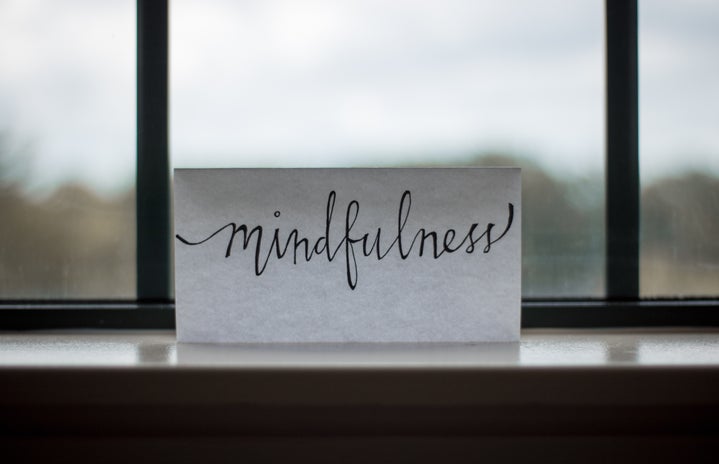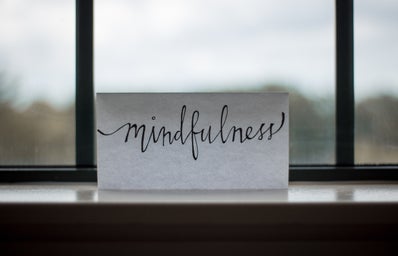While I can trace anxiety attacks back to early childhood, I began experiencing frequent panic attacks around twelve or thirteen years old. They were debilitating and would render me breathless. I can still recall the sheer terror that overcame me and the lengths I would go to to avoid triggering them. I would avoid places and certain situations and people until eventually there was nothing left to avoid but myself (and that was not possible). This avoidance did not help my anxiety, either; it made it worse. To say anxiety makes you paranoid would be a drastic understatement akin to stating Joseph Stalin was “kind of a bad guy”. If you want to learn how to manage your anxiety, you have to stop running away and give in to it, knowing that nothing bad is going to happen. This approach comes down to a fundamental understanding of what this mental paranoia ultimately is: just thoughts misinterpreted as danger. One cannot choose their thoughts no matter how much one may try to curb them. Besides, this would be counterproductive as the problem is not the content of one’s thoughts, but the tendency to attribute meaning to them. You might have doubts about what I just said, so let us put this to the test. If I tell you not to think of a purple elephant, what do you think of? The thought of a purple elephant pops in your head, and if you are a visualizer, perhaps an image of one, too. Did you have a choice in the matter? No. The thought that occurred to you was dependent on outside influences. This concept can get applied to all thoughts. We never know where a thought comes from or what brought it on; they simply arise and will stick around longer if we engage with them. Do you have a choice in what you think about it? It may seem to be the case, but you are ultimately limited by what thoughts occur to you, which comes down to brain chemistry. Neuroscientists have discovered that brain activity can predict decision making 11 seconds before a person consciously makes a decision (Goldhill, 2019). This finding suggests that you have no free will when it comes to decision making and thoughts themselves.
This information brought me to what I found to be a solution or at least an extremely valuable tool in promoting mental wellbeing: meditation. If you are anything like me, you are probably thinking:
“oh, meditation isn’t for me, I could never sit still or focus long enough for it to work.” “I’ve tried it, but it doesn’t work for me, because I can’t stop thinking.”
To address the first concern of impatience and distraction, it is called a “practice” for a reason. Everyone starts somewhere, and I can assure you that even the most advanced meditators who go on month-long meditation retreats to meditate for the majority of the day every day, would have struggled with sitting in silence for five minutes in the very beginning. This reality is why you should ease yourself into the practice in small increments, perhaps starting with 5 minutes, or if that is too difficult just one or two minutes. I want to address the second concern about not doing meditation “properly”, or not believing you failed because you could not get rid of thoughts. This mindset is a fundamental misunderstanding of what meditation is and the purpose. The point is not to banish thoughts from your mind. As I stated earlier, this is impossible. Instead, you want to train yourself to stay focused on something that serves as an anchor, like the breath or sensations in the body or the visual field of your closed or open eyes. When thoughts come (and they will come), you want to observe, rather than engage. This tactic will be quite hard in the beginning. You will get distracted, start thinking, and before you know it, you are planning out your shopping list for the day, which is okay. What you want to do from here is to recognize that you have been thinking and return your focus to the breath or whatever sensations of consciousness you choose to focus on. Some people choose to practice on their own with nothing but the use of a timer, while others will find guided meditations to be particularly helpful in holding them accountable. It does not matter which you do because the point of this practice is to distance ourselves from our thoughts and stop giving in to the stories we tell ourselves. When you can remove this sense of identification with your thoughts, you will treat them with the same regard as passing clouds. They come and go, but you do not need to concern yourself with them. The same can be said for emotions. Emotions such as anger and sadness are usually not emotions we want to prolong for any longer than they first appear, or so you would think. However, one can only be angry or sad for a considerably short amount of time unless you continue to feed the emotion through thinking. Learning to stay present and let go of thoughts and unwanted feelings will improve your emotional well being and make you less reactive. You can genuinely train yourself to suffer less.
Over time, you will find that you can practice for longer periods and that you are becoming less distracted during your practice. You may notice changes in your life, outside of your meditation practice, too. You may be less reactionary, more patient, better able to regulate your emotions, and of course, less consumed by your thoughts. A study by Harvard University found that participants who participated in an 8-week meditation study had improvements in memory, sense of self, empathy, and stress and the study demonstrates that changes in the brain structure may underlie some of the reported improvements (McGreevey, 2011). Other studies have shown improvements in emotional regulation and the management of mental illness. Studies on participants suffering from Obsessive-Compulsive Disorder (OCD) experiencing intrusive thoughts, who engaged in thought suppression and experienced thought-action fusion (the belief that thought in one’s head means that it will happen in real life) showed improvements (Hershfield & Corboy, 2014). However, meditation is not just for people who are actively suffering or who need some sort of mental reset in their life. You may lead a genuinely good life, be mentally healthy, and do not consider yourself a victim of your thoughts. One day, however, everyone is going to fall on hard times. No matter how great things maybe now, we will all experience the loss of loved ones, tragedies, sorrow, and heartache. Neuroscientist Sam Harris has described meditation as “preparation for the worst day of your life” and that specific phrasing struck something in me, because if I think I’m suffering now, well I have another thing coming when I have to operate in this world without certain loved ones by my side or when I have to do deal with the emotional turmoil and worry that comes along with having a child. Meditating for just eight weeks has been shown to alter gray matter in the brain.
How long to meditate and even what type of meditation you engage in is entirely up to you. I have found that twenty minutes a day of mindfulness meditation has been the most optimal method for me, as someone who is a busy college student. I take advantage of the Waking Up meditation app to send me daily reminders and I find that guided meditations make for a better experience, especially if I find myself getting lost in thought. A guiding voice to remind me what to focus on and the importance of not judging myself for getting lost in thought (judgment is just another thought) prevents me from getting lost. I am not here to tell you that meditation will magically erase all of your problems, especially not a mental illness. It certainly can help manage it though and can be incredibly useful in improving anyone’s overall quality of life. There are so many reasons to start practicing, choose which one is most important to you, and use that as your motivation to stay on track. You must refrain from judgment if you miss meditations or if you found a specific meditation to be unproductive. The act of judgment is the problem we are trying to solve, not contribute to. Being lost in thought is the cause of a lot of unnecessary suffering, but that does not need to be the way you live your life.
Goldhill, O. (2019, March 9). Neuroscientists can read brain activity to predict decisions 11 seconds before people act. Quartz. https://qz.com/1569158/neuroscientists-read-unconscious-brain-activity-t… Hershfield, J., & Corboy, T. (2014). Mindfulness and Cognitive Behavioral Therapy for OCD. International OCD Foundation. https://iocdf.org/expert-opinions/mindfulness-and-cognitive-behavioral-t… McGreevey, S. (2011, January 21). Eight weeks to a better brain. The Harvard Gazette. https://news.harvard.edu/gazette/story/2011/01/eight-weeks-to-a-better-b…



